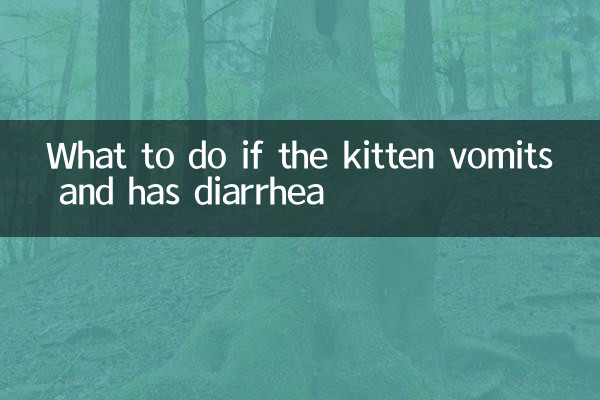What to do if the kitten vomits and has diarrhea
Vomiting and diarrhea in kittens are common problems for pet owners and may be caused by a variety of reasons. This article will be fromCause analysis, symptom judgment, emergency treatment, preventive measuresIn other aspects, we provide you with detailed solutions and attach relevant data for reference.
1. Common causes of vomiting and diarrhea in kittens

Kittens have relatively fragile digestive systems. The following table lists common causes of vomiting and diarrhea:
| Cause category | Specific reasons | Symptoms and manifestations |
|---|---|---|
| Dietary issues | Food spoiled, overfeeded, suddenly changed food | Vomiting undigested food, soft stool or watery stool |
| Parasitic infection | Roundworms, tapeworms, coccidius, etc. | Feces carry insects or bloodshots, lose weight |
| Viral infection | Feline plague (panolleukopenia), coronavirus | Frequent vomiting, diarrhea, fever, and mental depression |
| Bacterial infection | Salmonella, E. coli | Diarrhea, foul smell, may be accompanied by vomiting |
| Stress Response | Environment changes, frightened | Transient vomiting or soft stool |
2. How to determine whether you need medical treatment?
The following situations requireSeek medical treatment now:
1. Vomiting or diarrhea lasts for more than 24 hours;
2. Feces carry blood, mucus or foreign objects;
3. Accompanied by fever (body temperature exceeds 39.5℃), extremely poor mental health;
4. Kittens have symptoms of dehydration (poor skin elasticity and dry gums).
3. Emergency measures
1.Fasting for 4-6 hours: Stop feeding, but provide a small amount of warm water to avoid dehydration.
2.Feed probiotics: Such as probiotics for pets, which help restore the balance of intestinal bacteria.
3.Gradually resume diet: Feed easily digestible foods (such as soft-soaked kitten food or chicken puree).
4.Keep the environment warm: Kittens have poor temperature regulation ability and avoid aggravated symptoms of cold catching.
4. Preventive measures
1.Regular deworming: Kittens are recommended to deworm once a month and once every 3 months after adulthood.
2.Scientific feeding: Choose high-quality kitten food to avoid feeding high-oil and high-salt foods for humans.
3.Vaccination: Get the triple vaccine of cats on time to prevent fatal diseases such as cat plague.
4.Reduce stress: Keep quiet during the adaptation period of the new environment, providing familiar toys or nest pads.
5. Related data reference (statistics on popular cat raising issues in the past 10 days)
| Popular question keywords | Search volume ratio | Main focus |
|---|---|---|
| Kitten vomits | 32% | Cause judgment, family handling |
| Kitten diarrhea | 28% | Is it contagious and safe to use medicine |
| Cat plague detection | 18% | Early symptoms, survival rate |
| Probiotic recommendations | 12% | Brand selection, feeding method |
| Emergency medical signal | 10% | Dehydration judgment, hospital selection |
Summarize
Kittens vomiting and diarrhea need to take different measures according to the severity of symptoms. Slight conditions can be relieved by adjusting diet and observation, but if accompanied by red flags, be sure to seek medical treatment in time. Doing a good job of prevention can effectively reduce the incidence of digestive diseases. If you have other questions, it is recommended to consult a professional veterinarian for personalized advice.

check the details

check the details